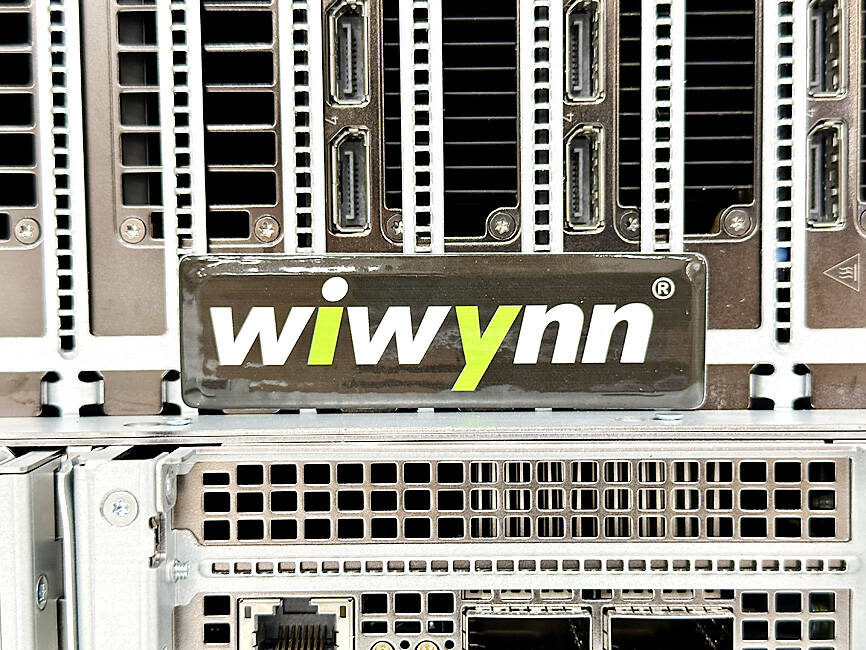Compal Electronics Inc (仁寶), Wistron Corp (緯創) affiliate Wiwynn Corp (緯穎) and US company Jabil Inc are set to submit revised offers for Advanced Micro Devices Inc’s (AMD) artificial intelligence (AI) server assembly plants, people familiar with the matter said.
Inventec Corp (英業達) and Pegatron Corp (和碩), which Bloomberg News previously reported were also interested in the assets, have since dropped out of the bidding, said the people, who asked not to be identified because the information is private.
AMD, which is working with an adviser, has called for refreshed bids to be submitted in the coming days, the people said.

Photo: Fang Wei-chieh, Taipei Times
The US firm is aiming to wrap up the sale by the end of the second quarter, in a deal that could be valued at US$3 billion to US$4 billion, Bloomberg News has reported.
The sale of the US manufacturing assets, which are based in Texas and New Jersey, come at a time when many Taiwanese electronics companies are rushing to build in the US to avoid current or future tariffs imposed by US President Donald Trump.
Bidders view the plants as valuable, because they come with 1,500, skilled employees, one of the people said.
AMD inherited the plants through its US$4.9 billion acquisition of ZT Systems, a deal that closed at the end of March. AMD last year said it would offload the manufacturing business to avoid competing with its customers, such as Dell Technologies Inc and Hewlett Packard Enterprise Co.
The deliberations are ongoing and there is no certainty that AMD would reach a deal.
Bloomberg Intelligence analysts Kunjan Sobhani and Oscar Hernandez Tejada estimated previously that the manufacturing division could sell for US$1.5 billion to US$3 billion.
The server manufacturing operations had revenue of about US$10 billion during the 12 months prior to AMD’s purchase.
For potential buyers, it is a chance to grab facilities used to make servers that are at the heart of the artificial intelligence boom.
Taiwanese firms, including Hon Hai Precision Industry Co (鴻海精密), rely on Mexico as a key AI server assembly and parts production hub. Since Trump’s win in November, Hon Hai has secured land in the US and last month said it would announce more investments in the US.
The board of its Taiwanese peer, Quanta Computer Inc (廣達), approved a US$230 million capital increase for its US unit.

SEMICONDUCTORS: The German laser and plasma generator company will expand its local services as its specialized offerings support Taiwan’s semiconductor industries Trumpf SE + Co KG, a global leader in supplying laser technology and plasma generators used in chip production, is expanding its investments in Taiwan in an effort to deeply integrate into the global semiconductor supply chain in the pursuit of growth. The company, headquartered in Ditzingen, Germany, has invested significantly in a newly inaugurated regional technical center for plasma generators in Taoyuan, its latest expansion in Taiwan after being engaged in various industries for more than 25 years. The center, the first of its kind Trumpf built outside Germany, aims to serve customers from Taiwan, Japan, Southeast Asia and South Korea,

Gasoline and diesel prices at domestic fuel stations are to fall NT$0.2 per liter this week, down for a second consecutive week, CPC Corp, Taiwan (台灣中油) and Formosa Petrochemical Corp (台塑石化) announced yesterday. Effective today, gasoline prices at CPC and Formosa stations are to drop to NT$26.4, NT$27.9 and NT$29.9 per liter for 92, 95 and 98-octane unleaded gasoline respectively, the companies said in separate statements. The price of premium diesel is to fall to NT$24.8 per liter at CPC stations and NT$24.6 at Formosa pumps, they said. The price adjustments came even as international crude oil prices rose last week, as traders

SIZE MATTERS: TSMC started phasing out 8-inch wafer production last year, while Samsung is more aggressively retiring 8-inch capacity, TrendForce said Chipmakers are expected to raise prices of 8-inch wafers by up to 20 percent this year on concern over supply constraints as major contract chipmakers Taiwan Semiconductor Manufacturing Co (TSMC, 台積電) and Samsung Electronics Co gradually retire less advanced wafer capacity, TrendForce Corp (集邦科技) said yesterday. It is the first significant across-the-board price hike since a global semiconductor correction in 2023, the Taipei-based market researcher said in a report. Global 8-inch wafer capacity slid 0.3 percent year-on-year last year, although 8-inch wafer prices still hovered at relatively stable levels throughout the year, TrendForce said. The downward trend is expected to continue this year,

Taiwan Semiconductor Manufacturing Co (TSMC, 台積電), which supplies advanced chips to Nvidia Corp and Apple Inc, yesterday reported NT$1.046 trillion (US$33.1 billion) in revenue for last quarter, driven by constantly strong demand for artificial intelligence (AI) chips, falling in the upper end of its forecast. Based on TSMC’s financial guidance, revenue would expand about 22 percent sequentially to the range from US$32.2 billion to US$33.4 billion during the final quarter of 2024, it told investors in October last year. Last year in total, revenue jumped 31.61 percent to NT$3.81 trillion, compared with NT$2.89 trillion generated in the year before, according to